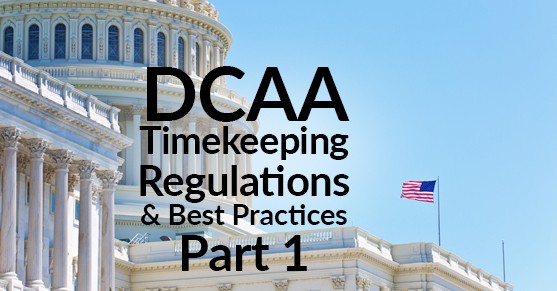When it comes to timekeeping, the DCAA doesn’t joke around and for good cause. Government contracting is a unique industry in which, at the end of the day, it’s the taxpayer’s money that goes to these projects. In the government contracting sector, timekeeping has the biggest potential for fraud — sometimes costing companies up to $18.5 million — which is why the government keeps a watchful eye over it with the DCAA maintaining strict rules and regulations around timekeeping.
The first installment of this blog series is intended to answer many of the questions that the experts at GovCon365 get asked on a regular basis regarding timekeeping compliance.
The Basic DCAA Timekeeping Requirements?
In order to comply with DCAA timekeeping regulations, here are some basic rules that you and your employees need to follow.
- All hours worked, including direct and indirect, must be recorded and reviewed by managers or supervisors.
- All hours logged must be charged precisely against each charge code.
- On a daily basis, every employee is responsible for recording their own time in either ink or via a timekeeping system. A manager or supervisor is not permitted to record time on behalf of an employee unless there is a good reason for them to do so (i.e., the employee is sick or traveling for work).
- Employees can not log their time prior to the job/work being done.
- Only one timecard or timesheet is allotted to an employee per work period.
- All corrections to time changes must be made in ink, and need to include a description of, and reason for the change, the initial change, and the time and date of said change.
- In order to verify the accuracy of each timesheet, the employees and their supervisor must review and approve all timesheets.
- For labor distribution purposes, timesheet documentation must not only include hours and dollars by the employee but the project name as well. Labor distribution ought to be reconciled monthly, which makes setting up job codes in the tracking system very important.
DCAA Regulations for Electronic Timekeeping Systems
We’ve mentioned an electronic tracking system a few times. That’s because they’re incredibly popular in our digital age and written, paper timesheets are slowly but surely becoming part of the past. No matter what system your company chooses to use though, it still needs to be DCAA compliant. And, not shockingly, DCAA has made accommodations in the regulations to maintain compliance for electronic systems. Here are the special requirements for electronic time-tracking systems:
- There must be password protection for logging into the system and each employee password must be changed every six months.
- To ensure that no unapproved changes can be made, employees are responsible for their timesheet and must maintain personal control over them.
- In accordance with the regulation stated above, employees are not allowed to enter work for hours not yet worked. They must enter their hours daily, but not in advance.
- A contractor’s system needs to have an audit trail function that documents all changes including the following:
- Dates
- Time Changes
- Employees
- Project Numbers and Chargee Codes
- Project/Timesheet Approvals
- Time-Stamped Submissions
- Correction Changes
- The electronic system should give users/employees the ability to upload other pertinent materials for specific jobs (such as documents, receipts, etc.).
DCAA Regulations for PTO and Overtime
At GovCon365, we’ve had a number of clients ask us about time tracking for overtime and paid time off when it comes to DCAA regulations and compliance. In our experience here are some of the “need-to-know” facts around PTO and overtime.
- It is required for government contractors to keep track of overtime hours for all employees, even if they are not paid by the hour (salaried employees). There is a key distinction between the types of overtime, which government contractors must understand for DCAA compliance:
- Uncompensated Overtime: This is referred to salaried employees that, no matter how many hours they work, are paid the same amount, thus the overtime is “uncompensated.”
- Unpaid Overtime: According to the rules set out in the Fair Labor Standards Act (FLSA), unpaid overtime is the overtime hours that should be paid to the employee unless they meet some sort of cap or overtime restriction.
- For PTO, just as any other business in any other industry must record PTO, government contractors need to do so. Included in this area are sick days, holidays, vacation, etc.
The Importance of Written policies
We all know the importance of keeping written documents for company departments like HR. In the same way, compliance regulations for government contracting need to be accurately reflected in written procedures and protocols distributed to all of your employees. It may seem obvious, but it’s not uncommon for growing companies to forego evaluating their written policies. The bigger your company is, the more important it is to have well-written and well-disseminated written policies for compliance.
So, whether it’s the preparation of timesheets or time change codes, there needs to be documentation of policies and training for employees.
In part two of our blog series on DCAA compliance for timekeeping, we’ll discuss some of the major benefits of electronic timekeeping systems, and how systems like Microsoft Dynamics 365’s Project Service application makes the whole process easier. Also, if you’d like more information on DCAA compliance, check out our other blogs here.

